

Verse 100. One Pacifying Word Is Noble
Through a thousand speeches be
composed of meaningless lines,
better the single meaningful line
one hears, then comes to calm.
Explanation: Expressions replete with thousands of words are of no value. One single meaningful word is more valuable, if hearing it one is pacified.

Verse 101. One Useful Verse Is Better Than A Thousand Useless Verses
Though a thousand verses be
composed of meaningless lines,
better the single line of verse
one hears, then comes to calm.
Explanation: A poem replete with thousands of verses is of no value if it has no useful meaning. One single stanza pregnant with wisdom is more valuable, if hearing it one is pacified.
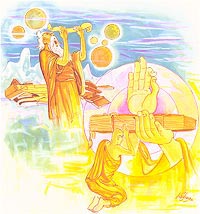
Verse 102. A Dhamma-Word Is Noble
Though a thousand verses chant
composed of meaningless lines,
better the single Dhamma-line
one hears, then comes to calm.
Explanation: One may recite hundreds of verses replete with meaningless expressions. If one recites one line of verse pregnant with wisdom, which is pacifying, it will be more valuable and nobler.
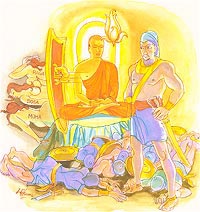
Verse 103. Self-Conquest Is The Highest Victory
Though thousand times a thousand
in battle one may conquer,
yet should one conquer just oneself
one is the greatest conqueror.
Explanation: One may conquer a thousand men in a thousand battles. But the person who conquers just one person, which is one’s own self, is the greatest conqueror.

Verse 104. Victory Over Oneself Is Unequalled
Greater the conquest of oneself
than subjugating others,
that one who’s always self-restrained,
that one who’s tamed of self .
Explanation: Self conquest is greater than the conquest of others. The victory of one who conquers himself cannot be turned into defeat. He remains a self controlled individual who lives ever disciplined.
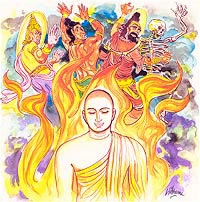
Verse 105. Victory Over Self Cannot Be Undone
Neither deva nor minstrel divine,
nor Mara together with Brahma,
can overthrow the victory
of such a one as this.
Explanation: Such conquest cannot be turned into defeat either by a god, spirit, a Mara (devil) or a Brahma (creator).

Verse 106. The Greatest Offering
Month by month for a hundred years
a thousand one might sacrifice,
but if for only a moment one
might honour the self-developed,
such honour were better by far
than century of sacrifice.
Explanation: One may make sacrifice every month for a hundred years; but, the honoured paid to one spiritually developed person, for a moment, is greater than oblations made for a hundred years.

Verse 107. Even Brief Adoration Of An Arahat Is Fruitful
One might tend for a hundred years
the forest’s sacred fire,
but if for only a moment one
might honour the self-developed,
such honour were better by far
than centuries of sacrifice.
Explanation: A person may perform fire-worship ritual in the forest for a hundred years. Yet, for a person who adores just for a moment, a self-restrained, disciplined Arahat, that moment’s adoration of the Arahat is far nobler than the fire-worship of hundred years.

Verse 108. Worshipping An Unblemished Individual Is Noble
Whatever one who merit seeks
should for a year make sacrifice,
all comes not to a quarter part
of honouring the Noble.
Explanation: In this world, an individual seeking merit may give alms and offerings during a religious festival. Or else that person may conduct an elaborate sacrifice for a whole year. But the merit from all those activities put together is not even one-fourth the merit one gets by paying homage to a person who walks straight – an arahat.

Verse 109. Saluting Venerables Yields Four Benefits
For one of respectful nature
who ever the elders honours,
long life and beauty, joy and strength,
these qualities increase.
Explanation: If a person is in the habit of constantly honouring and respecting those who are developed and mature, their lives improve in four ways. Their life span soon increases. Their complexion becomes clearer. Their good health and comfort will improve. Their vigour and stamina too will increase.

Verse 110. Virtuous Life Is Noble
Though one should live a hundred years
foolish, uncontrolled,
yet better is life for a single day
moral and meditative.
Explanation: A single day lived as a virtuous, meditative person is greater than a hundred years as an individual bereft of virtue and uncomposed in mind.

Verse 111. A Wise One’s Life Is Great
Though one should live a hundred years
foolish, uncontrolled,
yet better is life for a single day
wise and meditative.
Explanation: A single day’s life of a wise person, who is aware of reality, is greater than even a hundred years of life of an individual who is bereft of wisdom and insight.
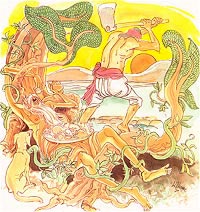
Verse 112. The Person Of Effort Is Worthy
Though one should live a hundred years
lazy, of little effort,
yet better is life for a single day
strongly making effort.
Explanation: A single day’s life of a wise person who is capable of strenuous effort, is nobler than even a hundred years of life of an individual who is lazy, incapable of making an effort and is wanting in initiative.

Verse 113. Who Knows Reality Is Great
Though one should live a hundred years
not seeing rise and fall,
yet better is life for a single day
seeing rise and fall.
Explanation: A single day’s life of a person who perceives the arising and disappearance of things experienced is nobler and greater than the hundred-year life-span of a person who does not perceive the process of the rising and disappearance of things.
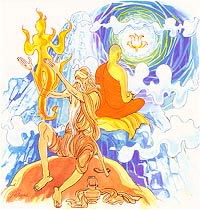
Verse 114. The Seer Of The Deathless Is A Worthy One
Though one should live a hundred years
not seeing the Deathless State,
yet better is life for a single day
seeing Deathlessness.
Explanation: A single day’s life of a person who sees the state of deathlessness is far greater and nobler than the hundred -years life-span of a person who does not perceive the deathless state.

Verse 115. Life Of One Who Knows The Teaching is Noble
Though one should live a hundred years
not seeing Dhamma Supreme,
yet better is life for a single day
seeing Dhamma Supreme.
Explanation: A single day’s life of a seer of the Noble Teaching of the Buddha is by far greater than the life of a hundred years of a person who does not see the Noble Teaching.

